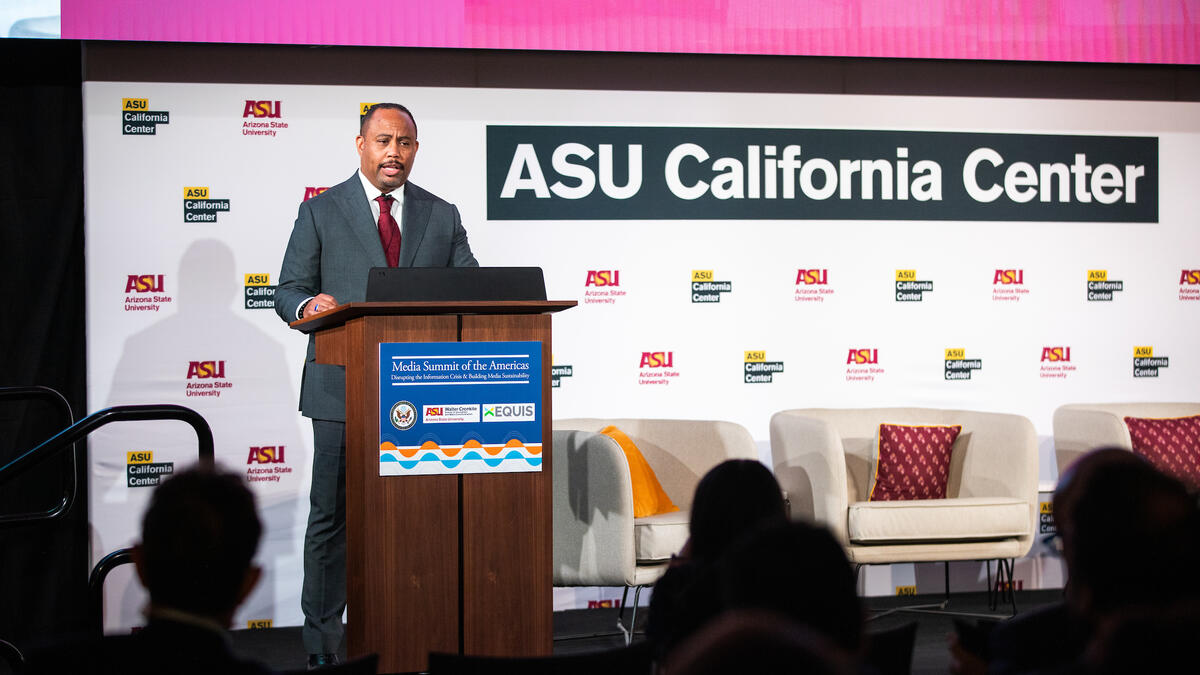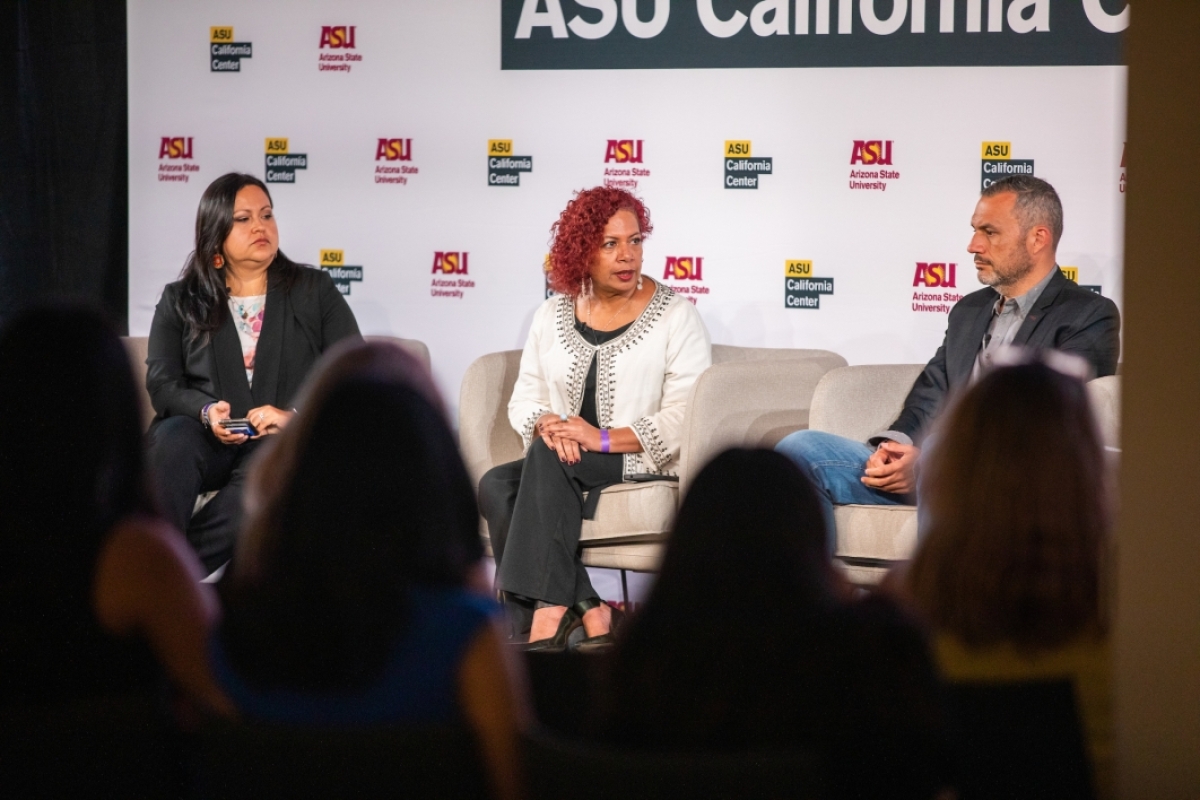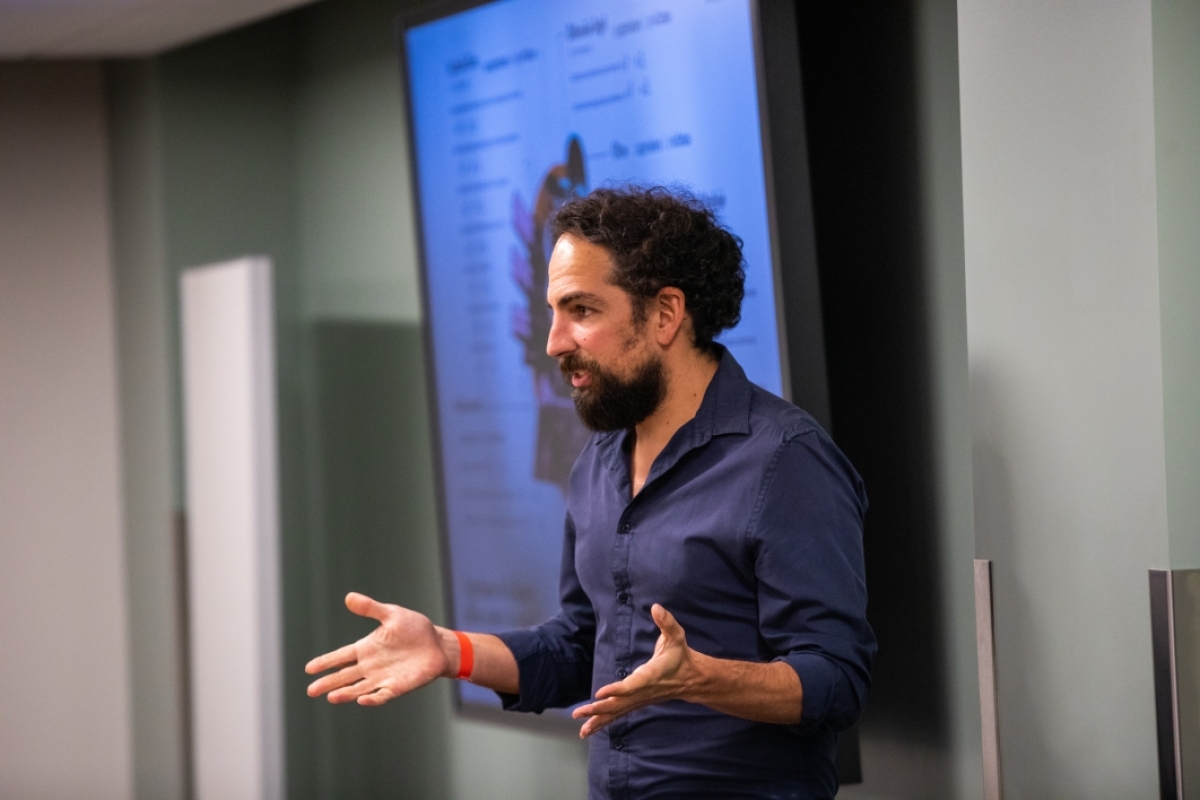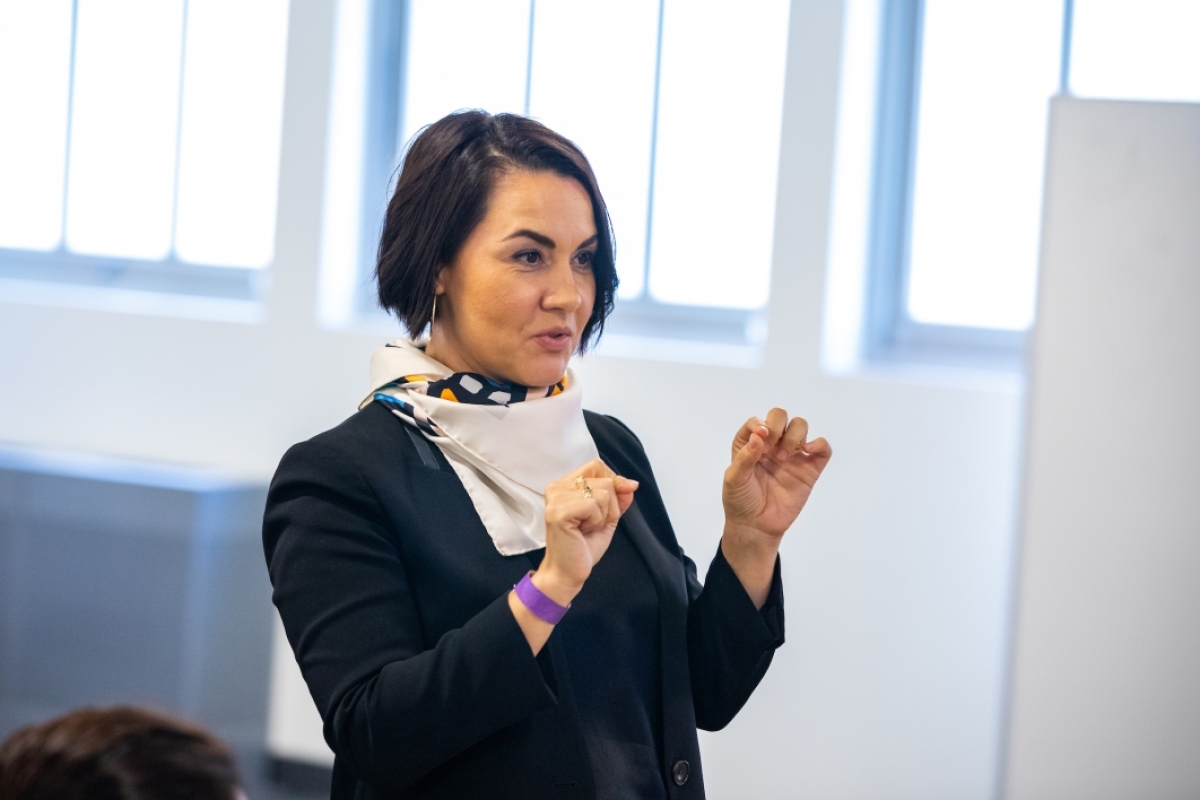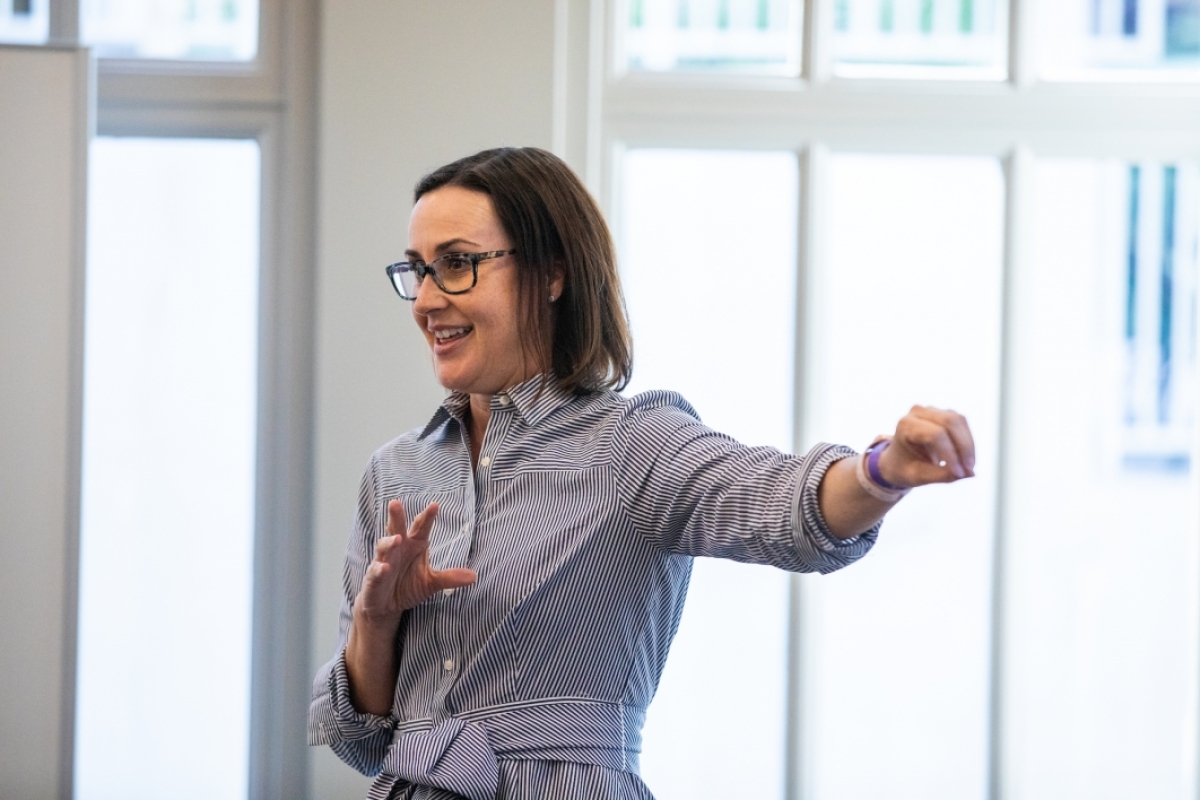The new ASU California Center hosted the first Media Summit of the Americas on Tuesday, a global journalism conference that drew a top government official and a major whistleblower, as well as Latin American journalists who work under threat from their own governments.
The new California Center is a perfect place for a journalism conference because it’s in the Herald Examiner Building, which used to house one of the top newspapers in the country, said Battinto Batts Jr., the dean of the Walter Cronkite School of Journalism and Mass Communication. The Cronkite School hosted the conference in partnership with the Equis Institute, a hub for leaders in the Latino community working to increase civic participation in American democracy.
“Where we are gathering is a former press room for the Herald Examiner,” Batts said, asking the crowd to visualize the presses running during the newspaper’s heyday. The building sat vacant after the Herald Examiner went out of business in 1989, and ASU spent four years renovating the structure in downtown Los Angeles.
The ASU California Center houses a bureau of Cronkite News, run by student journalists, Batts said.
“We are leaders in the fight against mis- and disinformation,” he said. “We couldn’t be more thrilled to be the platform to discuss this global threat.
“Although our craft has existed since ancient Roman times, journalists still face violence, censorship and intimidation today.”
RELATED: Secretary of state emphasizes value of a free press at ASU-hosted event
Tuesday’s Media Summit of the Americas was part of the weeklong Summit of the Americas event, which was held at the Los Angeles Convention Center.
Roberta Braga is the director for counter-disinformation strategies at Equis. She said that the conference was intended to discuss the broader ecosystem of disinformation.
“If we’re all living in an era where we can’t even agree on what truth is and we’re all consuming information in silos, then we’re in a moment of time — and our research has found this — where we’re too unsure to believe or too exhausted to get engaged with information, and both of those things are problematic for democracy,” she said.
Facebook whistleblower Frances Haugen was one of the speakers at the Media Summit of the Americas, hosted by the Walter Cronkite School of Journalism and Mass Communication on Tuesday at the ASU California Center in downtown Los Angeles. Photo by Deanna Dent/ASU News
One of the conference speakers was whistleblower Frances Haugen, a data engineer at Facebook who released internal documents that she said showed how the social media giant’s algorithms prioritized hyperpartisan content and hate speech.
Haugen said that people think of Facebook as a way to connect with friends and family.
“The reality is that Facebook hasn’t been that since like 2008,” she said. “Over that period of time, Facebook has pushed us into more and more content that we never asked for.
“Facebook had to make more money every single quarter. I always like to joke that the problem with Facebook is that your family and friends let Facebook down.”
In the early years, Facebook’s goal was to increase time spent on the site. But the company realized that higher engagement created more content, and emotional content drives more engagement.
“The shortest path to a click is anger,” she said. “The angrier the comment thread, the more it gets reshared.”
Algorithms don’t show everyone the same content, she said.
“Eighty percent of the COVID disinformation in the United States only went to about 4% of the population.
“For the part of the population in that 4%, post after post after post was ‘Your children are in danger.’ And it’s a rational response if all you’re seeing is ‘Your child is in danger,’ wouldn’t you show up at a school board meeting and threaten a teacher if that’s all you saw?”
This is critical because in some parts of the world, Facebook is more than social media — it’s actually the internet. In some countries, Facebook subsidizes people’s data when they use the platform, while they must pay for the data if they visit sites on the open internet.
“They did that for enough people that it became disadvantageous for businesses to have their own websites, for newspapers to have their own websites,” she said.
Haugen said that after the initial frenzy of attention over Facebook’s algorithms, it seems that nothing has changed.
“But we’ve already seen some amazing steps forward,” she said, noting a children’s privacy bill in the Senate that has bipartisan support. “I think there will probably be a web-free, Facebook-like site that will come along that will be owned by its users,” she said.
While Haugen’s revelations were horrifying, she remains optimistic.
“Every single time we invented a new kind of media, it’s been super disruptive,” she said.
The printing press unleashed the first era of disinformation.
“You had people printing pamphlets on how your neighbors were witches,” she said.
“Until we wrestle with it and until we push for something that works, it will feel chaotic. But we’ve done it before and we can do it again.”
WATCH: What it was like to be part of the summit
The Media Summit of the Americas featured several other sessions, in both Spanish and English:
- A panel discussion with independent journalists from Colombia, El Salvador and Venezuela.
- A talk by Luis Almagro, secretary-general of the Organization of American States, who discussed the role of governments in supporting media integrity.
- Breakout sessions on censorship, fact checking, data privacy and media literacy training.
The Media Summit of the Americas also hosted a talk by U.S. Secretary of State Antony Blinken, who described efforts by the U.S. government to support independent journalism in the Americas.
Blinken participated in a Q&A with two current students and one graduate of the Cronkite School. He said he was inspired by them.
“I am so glad that you’re doing this, as I’m dead-serious about the proposition that this lies at the heart of our democracies. And as goes journalism, as goes a free media, so go our democracies,” he said.
Top photo: Battinto Batts, dean of the Walter Cronkite School of Journalism and Mass Communication, said on Tuesday that the ASU California Center was the perfect place to host a journalism conference because it's the former home of the Herald Examiner newspaper. Photo by Deanna Dent/ASU News
More Law, journalism and politics
Spring break trip to Hawaiʻi provides insight into Indigenous law
A group of Arizona State University law students spent a week in Hawaiʻi for spring break. And while they did take in some of the sites, sounds and tastes of the tropical destination, the trip…

LA journalists and officials gather to connect and salute fire coverage
Recognition of Los Angeles-area media coverage of the region’s January wildfires was the primary message as hundreds gathered at ASU California Center Broadway for an annual convening of journalists…

A new twist on fantasy sports brought on by ASU ties
A new fantasy sports gaming app is taking traditional fantasy sports and mixing them with a strategic, territory-based twist.Maptasy Sports started as a passion project for Arizona State University…


